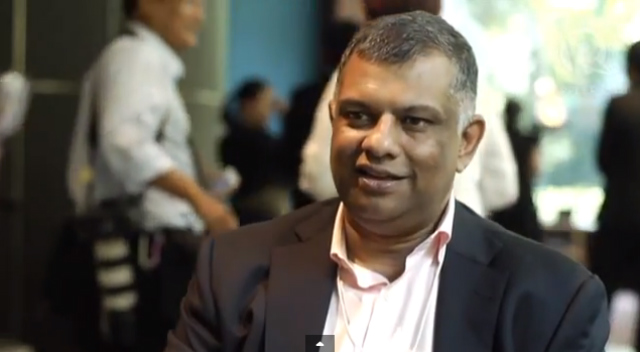SUMMARY
This is AI generated summarization, which may have errors. For context, always refer to the full article.

MANILA, Philippines – The Association of Southeast Asian Nations (ASEAN) should improve its “branding” to solve one of its biggest problems: a “disconnect” between the government and private businesses, a top businessman said Thursday, May 22.
Tony Fernandes, CEO and founder of AirAsia, said ASEAN should do this to reach the “perfect scenario” – economic integration by 2015. (READ: A united region: The ASEAN Community 2015)
Explaining the disconnect, Fernandes told Rappler executive editor and CEO Maria Ressa: “I think politicians sit down and have lots and lots of meetings, and sign lots of declarations and stuff. But implementation is, maybe, not as effective. ‘We’re gonna do this, gonna do this, gonna do this.’ And then they don’t talk to the guys on the ground to really know what needs to be done.”
He added, “What does ASEAN mean to any person out on the street, in Makati right now? Probably zero.” (Watch the full interview below)
“ASEAN has to raise this consciousness, it has to raise this awareness level, it has to weigh its branding,” Fernandes said on the sidelines of the World Economic Forum on East Asia, which the Philippines is hosting in Makati City. (READ: Aquino at WEF: Inclusive growth is PH’s yardstick)
He suggested, for instance, renaming the Southeast Asian (SEA) Games as the ASEAN Games. He also proposed having an ASEAN Film Awards “that is truly ASEAN.”
Fernandes cited Boracay, known for its white-sand beaches, as “a classic case of what needs to be done.”
“Anyone who goes to Boracay is gonna say this is the most beautiful place in the world. It is; it really is. I’ve never seen sand like it. I’ve never seen sea like it. And I’ve been to pretty cool places,” he said.
Yet, while he is 50, he had never been to Boracay “until recently.”
“The challenge now is… to make ASEAN one place, and to give the people of ASEAN the real benefits of being someone in ASEAN, which I think they don’t see yet,” Fernandes said.
Integration and taxes
He also stressed putting “national interest” over “vested interest.”
In the Philippines, Bureau of Internal Revenue Commissioner Kim Henares said taxation remains one of the biggest challenges.
Henares said the Philippines’ current tax regime, which critics claim is too stiff, will eventually help attract foreign direct investments (FDIs).
The infrastructure problem, after all, is the biggest obstacle to boosting FDIs. “If we don’t collect taxes, we will never address the infrastructure problem, and the FDI figure will remain low.” (Watch the full interview below)
Will the ASEAN integration change the way she works? Henares said, “Not for taxation.”
“Taxation is the very essence of a sovereign state. So even with an economic community, if you believe yourself to be a sovereign country, you will never surrender how you will tax the people inside that territory,” Henares said.
The ASEAN economic integration by 2015 aims for an ASEAN Economic Community, which involves the following factors: “(a) a single market and production base, (b) a highly competitive economic region, (c) a region of equitable economic development, and (d) a region fully integrated into the global economy.” – Rappler.com
For live updates on the World Economic Forum on East Asia 2014, visit our live blog here.
For everything you need to know about WEF on East Asia 2014, visit Rappler’s microsite.
Add a comment
How does this make you feel?
There are no comments yet. Add your comment to start the conversation.